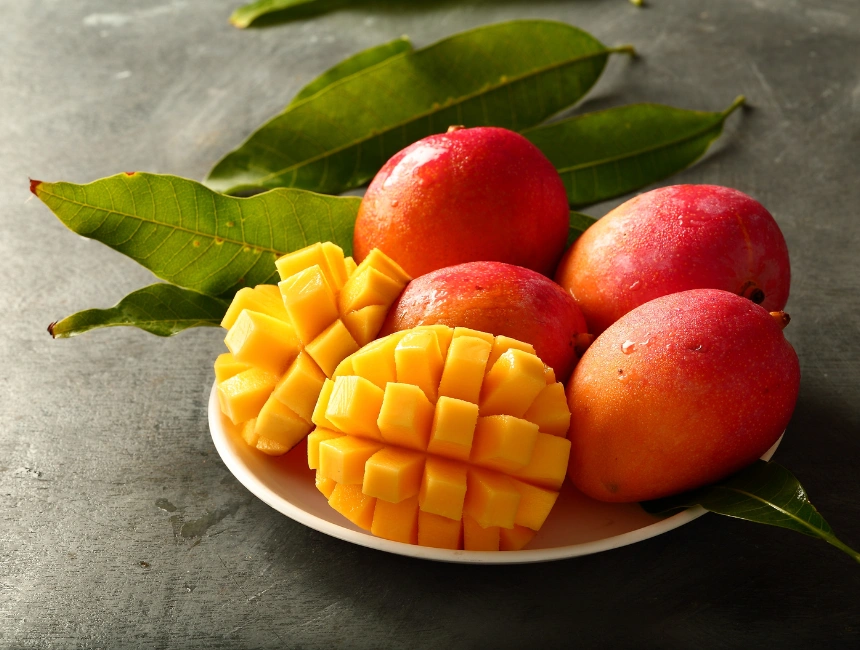Mangoes are more than just a sweet and juicy treat. They’re packed with powerful nutrients that can transform your health. Known for their vibrant color and irresistible flavor, the health benefits of mangoes range from improving digestion and boosting immunity to enhancing skin health and protecting your heart. If you’re looking for a delicious way to support your well-being, mangoes are the perfect addition to your diet, offering both incredible taste and impressive health benefits in every bite.
What Are Mangoes?
Mangoes are a tropical fruit known for their sweet, juicy flesh and vibrant colors ranging from deep orange to yellow and red. Native to South Asia, particularly India, mangoes have been cultivated for over 4,000 years and are now grown in tropical and subtropical regions worldwide. They are often referred to as the “King of Fruits” because of their rich taste, versatility, and impressive nutritional profile.
Mangoes come in various sizes and shapes, with a large pit in the center surrounded by succulent, juicy flesh. Their skin is typically thick and inedible, but inside, the fruit is packed with essential nutrients like Vitamins A, C, and E, along with dietary fiber, potassium, and antioxidants.
This fruit is enjoyed in many forms: fresh, dried, frozen, or even as a juice. Beyond their delicious flavor, the health benefits of mangoes are numerous, making them a popular choice for those looking to boost their diet with natural sweetness and nutrition.
Top Health Benefits of Eating Mango You Should Know

Boost Memory and Brain Function
Struggling to remember things? One of the standout benefits of mangoes is their ability to improve brain function and memory. This fruit contains glutamic acid, an essential amino acid that acts as a chemical messenger for the brain. It stimulates focus and enhances memory, making mangoes a natural brain booster. Incorporating them into your diet can help maintain mental performance as you age and may even prevent neurological disorders like Alzheimer’s.
Promote Radiant Skin and Healthy Hair
Are you looking for a natural remedy for your skin and hair issues? Mangoes are packed with Vitamin C, which helps unclog pores and treat acne. This vitamin also acts as a natural sunscreen, protecting your skin from harmful UV rays. Other nutrients like Vitamin A, potassium, and magnesium help rejuvenate the skin, leaving it looking fresh and youthful. In addition to these health benefits, the copper and Vitamin K in mangoes can nourish your hair, reduce dandruff, and prevent premature greying.
Enhance Libido Naturally
Mangoes can also benefit your physical and mental well-being by boosting your libido. Thanks to their high Vitamin E content, mangoes help balance sex hormones, increasing sex drive. This makes them an excellent natural option for enhancing your love life and supporting overall wellness.
Support Digestive Health
Mangoes play a vital role in improving digestion and relieving common digestive issues like constipation. They are rich in both soluble and insoluble fiber, which helps regulate bowel movements and promote a healthy digestive system. Just 150 grams of mango provide 12% of the daily recommended intake of fiber. Mangoes also contain enzymes such as esters, aldehydes, and amylase, which aid in reducing acidity and improving digestion.
Improve Eye Health and Vision
Did you know that mangoes can benefit your eyesight just as much as carrots? Mangoes contain carotenoids and antioxidants like lutein and zeaxanthin, which protect your eyes from harmful blue light. A single cup of chopped mangoes provides 25% of the daily recommended intake of Vitamin A, helping to prevent night blindness, dry eyes, and other vision problems.
Reduce the Risk of Cancer
Mangoes are a powerhouse of phytochemicals and antioxidants that can help prevent cancer. Mangiferin, a bioactive compound in mangoes, has shown anti-inflammatory and antioxidant properties that protect against various cancers, including leukemia, breast cancer, and lung cancer. By adding mangoes to your diet, you provide your body with the tools to combat the spread of cancer cells and boost overall immunity.
Lower Cholesterol Levels
Eating mangoes regularly can help manage cholesterol levels naturally. They are free of cholesterol and high in pectin, a dietary fiber that reduces bad cholesterol (LDL). Moreover, mangiferin in mangoes helps increase good cholesterol (HDL), making them a heart-friendly fruit that reduces the risk of heart disease.
Combat Anemia
Mangoes are an excellent source of iron, which makes them especially beneficial for those struggling with anemia. Vitamin C in mangoes helps with the absorption of iron, making them a perfect addition to the diet of pregnant women or individuals with low iron levels. The folic acid content in mangoes also supports healthy pregnancy by preventing neural tube defects in developing babies.
Manage Blood Sugar Levels
Despite their sweetness, mangoes have a relatively low glycemic index of around 50, making them safe for people with diabetes when consumed in moderation. The fiber in mangoes helps control blood sugar levels by slowing digestion and reducing glucose spikes after meals. Mango leaves can also be used to manage diabetes; simply boil 4 to 5 mango leaves in water, let them steep overnight, and drink the decoction in the morning to reduce blood sugar levels.
Allergy Awareness
Although rare, some people may experience allergies to mangoes, particularly from the peel. If you develop rashes or blisters around the mouth after consuming mangoes, it’s best to avoid them. If you experience severe reactions like swelling of the throat or difficulty breathing, seek medical attention immediately.
Asthma Protection: Support Respiratory Health

One of the lesser-known health benefits of mangoes is their ability to help protect against asthma. This tropical fruit contains beta-carotene, a powerful nutrient that may reduce the risk of developing asthma. Found in other foods like papaya, broccoli, and carrots, beta-carotene helps the body fight inflammation and protect the airways. While it won’t cure asthma, incorporating beta-carotene-rich foods such as mangoes into your diet can support respiratory health and potentially lower the risk of asthma symptoms.
Improve Visual Range and Glare Protection
Mangoes don’t just improve your overall eye health; they can also help you see better in bright light. Thanks to the antioxidants lutein and zeaxanthin, mangoes can enhance your visual range and reduce the effects of glare. These antioxidants protect the retina and lenses while also helping your eyes adjust more quickly to bright light. So next time you find yourself blinded by a camera flash or sunlight, remember that regular consumption of mangoes might just help reduce that discomfort!
Strengthen Your Bones
Another fantastic health benefit of mangoes is their contribution to bone health. Mangoes are rich in Vitamin K, which is essential for maintaining strong bones and preventing osteoporosis. Vitamin K supports the body’s ability to absorb calcium, ensuring that bones stay strong and healthy. If your diet is low in Vitamin K, you may be at a higher risk of developing osteoporosis, so adding mangoes to your diet can provide a natural source of this bone-building vitamin.
Heart Health: Protect Your Cardiovascular System
Mangoes are a heart-healthy fruit that supports cardiovascular wellness. They are packed with fiber, potassium, and magnesium—nutrients that help prevent heart disease, reduce hypertension, and lower blood pressure. Potassium, in particular, works by relaxing blood vessels and maintaining a healthy pulse. Including mangoes in your diet can reduce your risk of heart problems while keeping your heart strong and functioning optimally.
Immune System Boost
Mangoes are a powerful ally for your immune system. They provide about 10% of your daily recommended intake of Vitamin A, a nutrient that plays a key role in keeping your immune system functioning well. Vitamin A supports your body’s defenses against infections and diseases. Additionally, the high levels of Vitamin C found in mangoes help boost the production of white blood cells, the body’s first line of defense against harmful pathogens. Together, these nutrients make mangoes an excellent choice for strengthening your immune system.
Weight Loss
Mangoes can be a great addition to a weight loss diet. Despite their sweetness, they are relatively low in calories and rich in fiber, which helps you feel full and satisfied for longer. The fiber in mangoes aids digestion and prevents overeating by promoting a sense of fullness. Plus, the natural sugars in mangoes provide a healthier alternative to processed sweets, making it easier to stick to a balanced diet. Eating mangoes in moderation can help you control your calorie intake while still enjoying a delicious treat.
Help Reduce Inflammation
Mangoes are rich in polyphenols, including mangiferin, which is a powerful antioxidant known to reduce inflammation. Chronic inflammation can lead to various health problems, including heart disease and cancer. By including mangoes in your diet, you can help reduce inflammation levels in your body, as the antioxidants work to neutralize harmful free radicals. This makes mangoes not only a delicious fruit but also a natural way to fight inflammation and promote overall health.
Improve Mental Health and Mood
Yes, mangoes can positively impact your mental health. They contain Vitamin B6, which plays a crucial role in the production of serotonin, the “feel-good” hormone that regulates mood and reduces the risk of depression. The natural sugars in mangoes also provide a quick energy boost, helping to improve focus and mental clarity. In addition, their rich supply of antioxidants helps reduce oxidative stress, which is linked to improved brain health. Eating mangoes can be a tasty and nutritious way to support mental well-being.
Mangoes: Frequently Asked Questions

Why is Mango Called the King of Fruits?
Mangoes are often referred to as the “King of Fruits” because of their rich taste, vibrant color, and wide range of health benefits. They are packed with essential nutrients that boost everything from digestion to heart health.
Can I Eat Mango on an Empty Stomach?
Yes, mangoes can be eaten on an empty stomach. They are light, full of fiber, and can aid digestion, making them an ideal snack first thing in the morning.
What Should You Not Eat with Mango?
It’s best to avoid combining mango with foods that may cause digestive discomfort, such as dairy products like yogurt or milk, as some individuals find this combination hard to digest.
Is Frozen Mango Healthy?
Yes, frozen mango retains most of its nutrients, making it a convenient and healthy option. It’s a great way to enjoy mangoes year-round, even when they are out of season.
Can We Eat Mango and Eggs Together?
Yes, there are no known harmful effects of eating mango and eggs together. Both provide different nutrients and can be part of a balanced diet. Eggs are an excellent source of high-quality protein, vitamins, and minerals, which complement the nutrients in mangoes. Combining mango and eggs offers a varied and nutrient-packed option for a balanced meal, maximizing the health benefits of eggs and mangoes.
Can I Eat a Mango Like an Apple?
Yes, you can eat a mango by peeling off the skin and eating it like an apple. However, most people prefer slicing or cubing it to avoid the fibrous pit in the middle. Both mangoes and apples offer numerous health benefits. For instance, while mangoes are packed with vitamins and antioxidants, apples are known for their fiber content and heart-healthy properties.
Discover more about the health benefits of apples in our detailed article.
Do Mangoes Make You Look Younger?
Absolutely! Mangoes are rich in antioxidants, Vitamin C, and Vitamin A, which help protect the skin, boost collagen, and reduce wrinkles, keeping your skin youthful.
Is It Good to Eat Raw Mango?
Yes, raw mangoes have their own set of health benefits. They are great for digestion, can help prevent heat strokes, and contain high levels of Vitamin C, making them a refreshing and nutritious choice.
What Are the Best Ways to Include Mangoes in Your Diet?
Mangoes are incredibly versatile and can be enjoyed in many different ways. You can eat them fresh as a snack, blend them into smoothies, or add them to salads for a refreshing twist. Adding mangoes to your salad not only enhances its flavor but also boosts the benefits of salad by providing essential vitamins and antioxidants. Mangoes can also be used to make healthy salsas, added to yogurt or oatmeal, or turned into a topping for toast. For a unique treat, try freezing mango chunks and blending them into a sorbet-like dessert. The possibilities are endless, making it easy to enjoy the health benefits of mangoes in various meals throughout the day.
Are There Different Types of Mangoes with Unique Benefits?
Yes, there are several varieties of mangoes, each with its own unique flavor and nutritional profile. Some popular types include Ataulfo, Tommy Atkins, Haden, and Kent mangoes. While all mangoes are packed with essential vitamins and minerals, some varieties may have slightly different levels of certain nutrients. For instance, Ataulfo mangoes are known for their creamy texture and higher Vitamin C content, while Tommy Atkins mangoes are fiber-rich and great for digestion. Exploring different varieties can help you enjoy a wider range of mango health benefits.
What Are the Differences Between Ripe and Raw Mangoes in Terms of Benefits?
Ripe and raw mangoes both offer numerous health benefits, but they serve different purposes. Ripe mangoes are sweet and juicy, making them ideal for improving digestion, boosting immunity, and promoting skin health due to their high Vitamin A and C content. On the other hand, raw mangoes are more tart and are often used to prevent heat strokes and aid in digestion. Raw mangoes are also rich in pectin, which is excellent for controlling blood sugar levels and supporting heart health. Including both raw and ripe mangoes in your diet can help you maximize their nutritional value.
How Many Mangoes Should You Eat in a Day for Maximum Health Benefits?
While mangoes are packed with nutrients, it’s essential to enjoy them in moderation. Eating about one mango per day, or 2 cups of chopped mango, is enough to reap their health benefits without overloading on natural sugars. Mangoes are naturally sweet, so keeping portion sizes reasonable ensures you don’t consume too much sugar. Since the key to a balanced diet is variety, combining mangoes with other nutrient-rich fruits and vegetables will help you achieve better overall health.
Are There Any Side Effects of Eating Mango?
While mangoes offer numerous health benefits, there are a few potential side effects to be aware of. Some individuals may experience allergies, especially from the skin of the mango, which can cause itching, rashes, or blisters around the mouth. In rare cases, people with a sensitivity to urushiol (a compound found in mango skin, similar to poison ivy) may experience more severe reactions.
Overeating mangoes can also lead to digestive issues, such as diarrhea, due to their high fiber content. Additionally, mangoes are naturally high in sugar, so consuming them in excess may affect blood sugar levels, particularly for those with diabetes. Moderation is key to enjoying mangoes without any adverse effects.
Conclusion: Why Mangoes Should Be on Your Shopping List
Mangoes are a true superfruit, packed with a variety of nutrients that provide numerous health benefits. From boosting brain function and supporting digestive health to enhancing skin radiance and reducing inflammation, the health benefits of mangoes make them an essential part of a well-balanced diet. Their natural sweetness, combined with their rich nutrient profile, makes mangoes not only a delicious treat but a powerful ally in your journey toward better health.
So, why wait? Add mangoes to your shopping list and start reaping their amazing benefits today!
Other Nutrient-Packed Foods to Add to Your Diet
If you’re looking to complement the health benefits of mangoes, consider adding these three superfoods to your meals:
- Avocados – Rich in healthy fats, fiber, and vitamins, avocados promote heart health, improve digestion, and support weight management.
- Watermelon – Packed with vitamins and antioxidants, watermelon helps hydrate your body, improves heart health, and supports skin health.
- Peanuts – A great source of protein and healthy fats, peanuts aid in muscle growth, heart health, and provide energy.
Incorporating these nutrient-dense foods into your diet alongside mangoes will help you create a well-rounded, health-boosting eating plan.
Remember, moderation is key, and it’s always best to consult with a healthcare professional before making any significant dietary changes.

Want more health tips?
Want to save these health tips? Enter your email below and get more health tips delivered to your inbox weekly!




